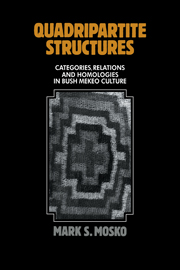Book contents
- Frontmatter
- Contents
- List of figures, tables, and maps
- Preface
- 1 Introduction: the problem and the people
- 2 Between village and bush
- 3 Body and cosmos
- 4 Sex, procreation, and menstruation
- 5 Male and female
- 6 Kin, clan, and connubium
- 7 Feasts of death (i): de-conception and re-conception
- 8 Feasts of death (ii): the sons of Akaisa
- 9 Tikopia and the Trobriands
- 10 Conclusions: indigenous categories, cultural wholes, and historical process
- Appendixes
- 1 Village resources derived from bush resources
- 2 Ingestion and ingestibles
- 3 Categories of food
- 4 Work and nonwork skills
- 5 Categories of human dirt
- 6 The myth of Foikale and Oa Lope
- 7 The afinama myth
- Notes
- Bibliography
- Index
- Frontmatter
- Contents
- List of figures, tables, and maps
- Preface
- 1 Introduction: the problem and the people
- 2 Between village and bush
- 3 Body and cosmos
- 4 Sex, procreation, and menstruation
- 5 Male and female
- 6 Kin, clan, and connubium
- 7 Feasts of death (i): de-conception and re-conception
- 8 Feasts of death (ii): the sons of Akaisa
- 9 Tikopia and the Trobriands
- 10 Conclusions: indigenous categories, cultural wholes, and historical process
- Appendixes
- 1 Village resources derived from bush resources
- 2 Ingestion and ingestibles
- 3 Categories of food
- 4 Work and nonwork skills
- 5 Categories of human dirt
- 6 The myth of Foikale and Oa Lope
- 7 The afinama myth
- Notes
- Bibliography
- Index
Summary
Version Ai
One day, all the men of the village went to the bush to hunt pig, cassowary, and wallaby with their nets and spears. In the evening, they came back to the village. The women cooked the meat and took it to the clubhouse where the men were gathered. The men ate all the meat, not giving any to the women to eat. When the men ate the meat, they called their sons to eat. All their wives and daughters ate nothing. The daughters went to stay with their mothers. Inside their houses, mothers and daughters waited for their husbands and fathers to call them, but they never did.
The next day, the men went hunting again, doing it the same way, and again they ate all the meat with their sons, sharing none with their wives and daughters. Day after day they did it in the same way.
Then one day, when all the men were away in the bush hunting, the women who remained in the village held a meeting. The husbands of the married women were not kind to their wives, and the women tried to do something. That day, one small boy had remained at home in the village. The women told him to climb a coconut tree and bring down some flock or netting in order for them to make wings (panina). When all the women finished making their wings, one of them tried to fly up to the coconut tree, and she sat up there. All the women looked up and said it was not good; she should use her feet to hang upside down.
- Type
- Chapter
- Information
- Quadripartite StructuresCategories, Relations and Homologies in Bush Mekeo Culture, pp. 265 - 270Publisher: Cambridge University PressPrint publication year: 1985



